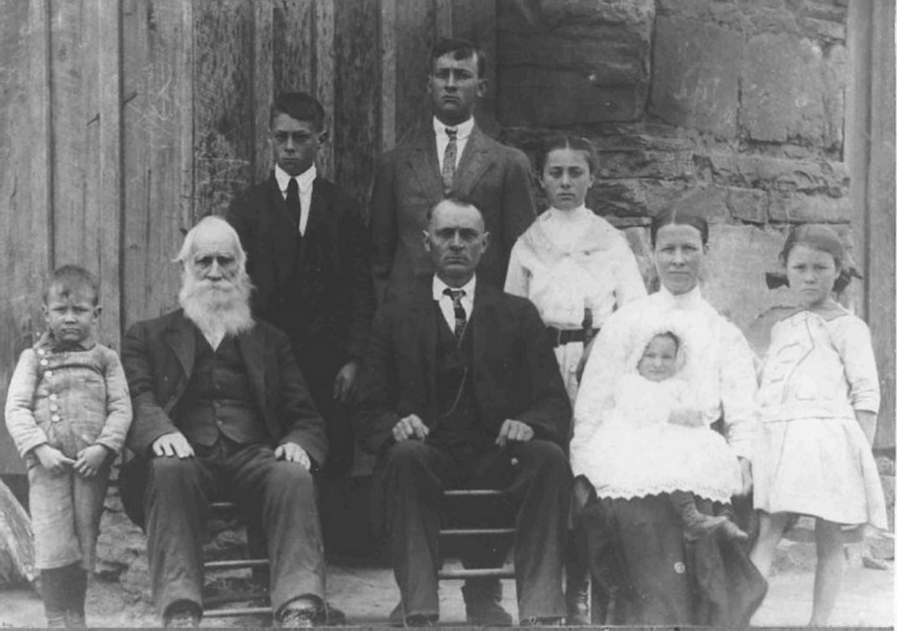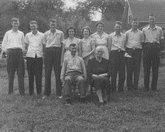|
Aiken: Variant of the Scottish name Aitkin, chiefly associated with Northern
Ireland
Allen: Popular personal name with
followers from Brittainy of William the
Conqueror and thence
imported first to England and then to Ireland,
possibly meaning little
rock
Barton: English, from places named in
Old English “bere” or “baer” plus “tun”,
meaning barley
enclosure or settlement
Beasley: English, from a place in
Lancashire named Beesley, perhaps from Old
English
“beos” meaning bent grass or “leah” meaning woodland
clearing
Bracken: Various sources, either Irish,
English or German
Bryson: Scottish, from words meaning son
of Brice or battle chief
Capps: Respelling of German Kappus
meaning cabbage grower
Chastain: French, from Old French
“castan” meaning chestnut tree,
nickname
for someone with chestnut colored hair
Clayton: English, from Old English
“clag” plus “tun” meaning clay
settlement. Numerous
places in Yorkshire, Lancashire and
Staffordshire are
named Clayton.
Davidson: Scottish, Northern English and
Jewish from personal name
David. German Jewish adds the-son from German “sohn”.
Also Americanized form of Norwegian, Danish and Swedish
spellings.
Davies or Daves: Welsh, common
surname in Wales, second only to
Jones, from the personal name Davy
Galloway: Scottish, from a region in
Southwest Scotland
Glazener: German, form of Glasner
or Glaser, meaning glass blower or glazier
Hamilton: Attributed to Hameldon Hill in Lancashire, Northern England with the
family's formal origins in the Lowlands of Scotland.
Havner or Hefner: South German or
Austrian, variant of Hafner, a potter
Holden: English, mainly Lancashire, from
Old English word “hol” meaning
hollow or
valley
Johnson: English and Scottish meaning
son of John
Jordan: Many sources but English
version may have come from the time
of the Crusades when it
was common to bring back flasks of water
from the River Jordan where Christ was baptized and use it to
christen their own
children, resulting in Jordan becoming a common
personal name
King: English and Scottish, from Old
English “cyning” meaning a tribal
leader, already used before
the Norman Conquest, a nickname in
the Middle Ages
Lance: Introduced to England by the
Norman invaders where it was a
popular name, mostly for
ruling classes, from Old French lance or
spear
Lyday or Lyda: Americanized form of
German Leidig, from German “liut”
meaning people or tribe and Middle High German “leidic”
meaning disagreeable or cantankerous
McDowell: Scottish and Irish,
Gaelic form means dark stranger, to distinguish
the dark haired Danish from the fair haired Norwegians. Could
also
be
from the Scottish clan McDougall, a branch of which went
to
Ireland.
McKinney or McKinna: Scottish, son of a
personal name equivalent to
Kenneth or Kenny, meaning beloved of the god of
fire
Nicholson: Scottish and Northern
English, son of Nichol,
Orr: Scottish, Northern English, Northern Irish, from the Old Norse “orri”
meaning blackcock, the male black grouse; or nickname for someone
with a sallow complexion from Gelic “odher”
meaning pale; or Old
English “ora” meaning shore, slope or flat topped ridge
and places
called Oare in
Berkshire, Kent and Wiltshire, England
Owen: Welsh or Scottish, from the Welsh
personal name Owain, or
Scottish/Irish from Gaelic
Mac Eoghain, son of Eoghan, or McEwen
Parker: English and irish, occupational
name for a gamekeeper, derived from
Middle English
“parc”
Patterson: Scottish and Northern
English, from a pet form of name Pate, short
form of Patrick, found in Ulster, Ireland used by people from
County
Galway, Scotland
Queen: Scottish, reduced form of
McQueen, son of Gaelic name meaning
pleasant
Weaver: English, occupational name
derived from Old English “wefan” or
habitational name
from a place on the Weaver River in Cheshire,
named from Old
English word “wefer”, winding stream. Also a
translated form of
German Weber which also means weaver.
Williamson: Scottish and Northern
English, son of William. The name William
was introduced into England at the time of the Conquest
and
becme the most popular personal name in England in honor
of
William the Conqueror.
Wilson: Scottish, English and Northern
Irish, son of Will, a common short
form of William in
Medieval times
^ Back to
Top
|






